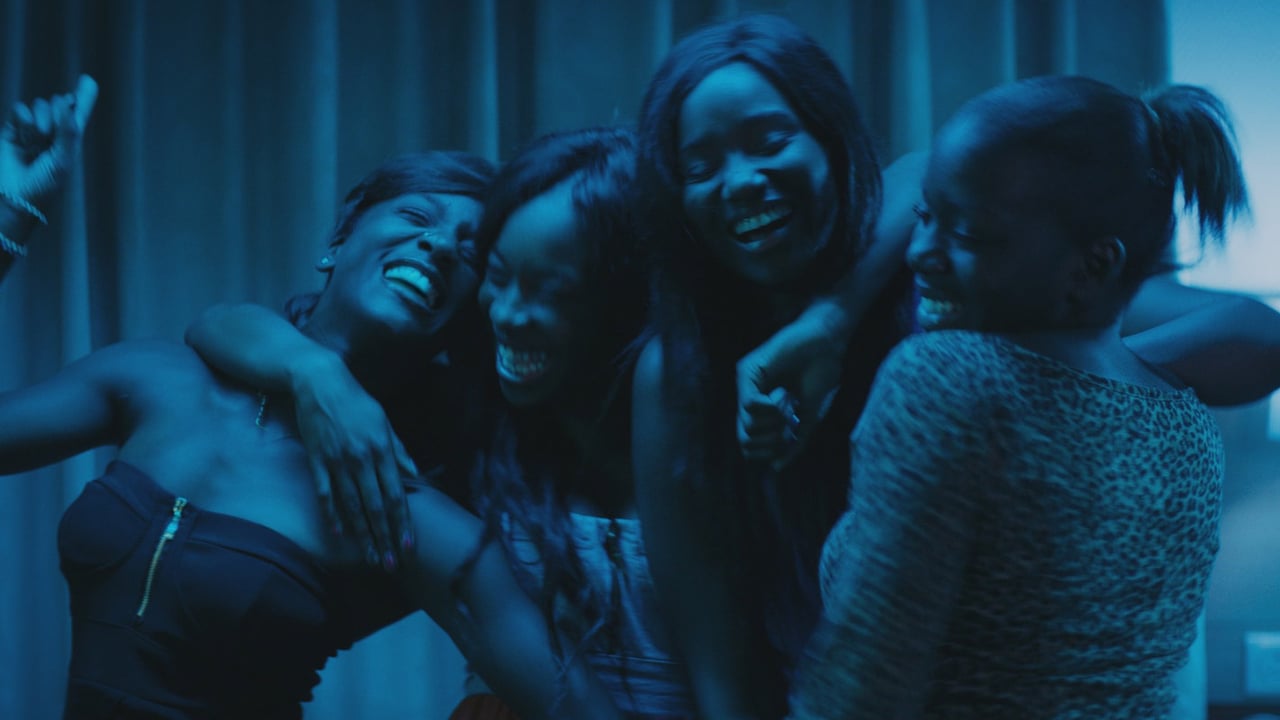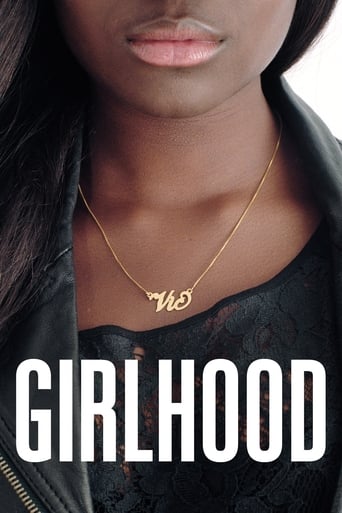Interesteg
What makes it different from others?
Tedfoldol
everything you have heard about this movie is true.
Dorathen
Better Late Then Never
Tayloriona
Although I seem to have had higher expectations than I thought, the movie is super entertaining.
pendenquejohn
Very interesting movie that proposes a "soft" perspective on the downfall of Karidja Touré in the spiral of delinquency and social exclusion. I think it touched most of the elements that trigger such an attitude and certainly the main one being the quest for having a better life in combination to the indifference of parents overcompensated by an excessively violent brother trying to play the role of a father and a mother.The rejection of school and the lack of solution for children in situation of family and educational failure is also well presented.I'm not so sure why it was made easy for her to enter a group of girls but the fact that they become her second family with their specific codes (which is no codes) is actually well illustrated. I think the perspective of the director was to propose a softer version of what reality truly is, however, it does not take away from the brutality of certain scenes which does bring the spectator to react and question the choices of Karidja Touré.I did expect her situation to degrade very profoundly but the film stayed on the its staying soft while showing the reality of things.Certain characters did seem a little bit caricatural at times to my feeling and was often quite an understatement to the brutality that really exists within "gangs" in general (though I'm fully aware that this clique of girls were not really a gang -; hence the absence of the true codes that drive these kinds of criminal organizations). Some of the girls did get a little "photoshopping" especially Karidja Touré.The quality of the image is quite good and the movie stays really dynamic. The reinforcement of the absence of any parental authority is well done. Indeed, the mother is extremely absent in the majority of the scenes and even if she would be, she has very little to say to her oldest daughter and daughters in general.The story holds until the end and the development of the Touré character is well conducted.
Tyshay Baker
I really enjoyed this movie. 9/10 I will cut off a foreign film but I was intrigued so I turned on the subtitles and stuck it out until the end. However, I think I could have followed the film without the subtitles at a certain point. When I read, gang in the description, I thought it'd be a very rough film but the friendship that was formed between the girls were beautiful. The decisions that were made by the characters were understandable due to their lives and circumstances. Though I may not agree with decisions I can understand them which isn't always the case sometimes. It didn't lose me until the last act. I don't feel like it was as tight, put together and well written as it was in the beginning. I understood, she'd rather live the life uncertainty than go back home but I just didn't have closure, I felt like all of the characters' fates were just as uncertain as I was, especially the main characters. I just felt left hanging and I wanted to know what happened to her.
LadiesAndMovies
Just saw the movie yesterday and absolutely loved it. I took to IMDb to read up on the director and actresses etc., as I often do when I like a movie. Imagine my surprise when the first review I saw was a long winy 'exposé' of calling the director a pervert in different ways. Say what? Also because the director is lesbian she must hate men, no other evidence needed really according to the author. While that's obviously laughable for anyone who's not a raging homophobe and anyone in their right mind will ignore that review I thought I'd offer my views since there are sadly so few others around here (yet). First I might disclose that I do have a weak spot for movies dealing with female friendships, and as the movie reminded me of Show me Love (Fucking Åmål), Marie Antoinette, Frances Ha and other female centered movies, it was hard for me not to love it. The friendship between Vic and Lady is especially touching, from Lady taking Vic on as a young shy protegé, to them bonding after Vic's victory in the fight she fought for Lady or for Lady's acceptance of Vic leaving. The scene where they are dancing all together or playing mini-golf reminds me of some of the few good scenes of The Bling Ring and perhaps The Spring Breakers, that unquestioning best friend kind of relationships that are never as strong as during your teenage years. Then of course you have Vic's close relationship and protectiveness of her younger sister. I almost cried when Vic sat all ashamed in the train reaching for her sisters hand, and then her sister finally forgave her. And then that final scene...If the only thing you get out of this movie is that you're watching the bodies of a group of young women, then you might want to take a serious look at yourself and how you relate to women. The only sense of any kind of possible objectification or sexual tension that occurred in my mind was when Vic was telling her boyfriend to undress.I could perhaps see that some, a handful, of the straight men watching this movie would confuse it's undertones of sisterhood for something else. After all if you've been feed movies where women are never friends (consider the Bechdel test), only possibly lovers for the male gaze to enjoy, then it might be hard to interpret this movie. It might be frustrating to see young women presented in any other way than the normal and since it doesn't fit your sensibilities interpret that as the 'lesbian gaze'. As a straight woman on the other hand I applaud this movie and wish there are many more like this one to come!
FrostyChud
Be warned: BANDE DE FILLES is not a realist drama about the struggles of young women of color in the hardscrabble French ghetto. It is the creepy erotic fantasy of a middle-aged white lesbian."Celine Sciamma must be a homosexual," I deduced as I left the theater, proud of myself for penetrating the mystery of BANDE DE FILLES. A quick Google search confirmed my intuition. How did I know? First of all, every man in the movie save one is a violent psychopath. The single exception to this rule is a simple idiotic chauvinist. Now, this is not a criticism as such. I am sure that the men who live in Marieme's projects are quite as bad as Sciamma portrays them to be. However, it is clear that in Sciamma's libidinal economy, men are by definition psychopaths, which does not amount to the same thing. Second of all, the film ends with the main character becoming a butch pre-lesbian complete with short haircut and bound breasts. Huh? Nothing prepares us for this development. The director clearly wants us to raise our fist and cheer for Marieme when, in the last scene, she bravely chooses an uncertain Elsewhere over the oppressive environment she grew up in. But I know where Sciamma sends her when she walks out of the frame: straight to her bed. Now, there is nothing wrong with filming one's fantasy and filming it dirty at that. Sciamma's bad faith lies in the way she hides it under an unconvincing pseudo-political drama. Had she filmed a straight exploitation movie I would have been the first to award it ten stars, but I hate Beautiful Soul hypocrisy and ideology. The director's creepiness is double. The actresses have no idea that the unrealistic drama Sciamma has written for them is nothing but a pretext to perv on the otherness of their black bodies. Watching the film, we sense that this act of subtle deception perpetrated on the actresses by the director is a necessary ingredient in Sciamma's perverse scenario. Not only is she getting off on their otherness, she is getting off their ignorance of what is really going on. How is this different from what Hitchcock does? After all, his greatest movies are all perverse fantasies of possession hidden within the socially acceptable form of the thriller. The crucial difference lies in the fact that Hitchcock never claimed, implicitly or explicitly, that he was helping anybody, that he was an agent of Good, or that he was giving a voice to the disenfranchised. He told us loud and clear: I am dangerous. I am not to be trusted. Enter my fantasies at your own risk. Back to BANDE DE FILLES. Every few minutes the dialogue stops and Sciamma treats us to an extended music clip during which the exotic black proles undulate poetically and emote into the void. These are the money shots that are supposed to give the film an allure of artistic integrity. All they do is shore up the idiocy and meaningless of the actions of the four main characters. What is pornography? It is the attempt to render visible something that is radically invisible, namely sex. More precisely, it is the mystery of feminine interiority that pornography betrays by purporting to show it. The fact that Sciamma is a woman does not make her attempt to show what cannot be shown any more legitimate. We all become idiots when we attempt to depict feminine jouissance.Visually, the film is difficult to watch because of the constant close-ups. They create a claustrophobic effect that renders directly Sciamma's desire to possess her characters. Her camera is glued to their skin, incessantly and pervily traveling up and down their bodies. The fight scenes, each of which ends with a black teenage girl being beaten, stripped, and humiliated in front of a frothing crowd, form the true center of the movie. Here is where Sciamma's slip shows. We can sense her licking her lips and getting excited as she films these girls clawing at each other like enraged pit bulls. Rather than focusing on the standard fixed body parts as the perverse male gaze would, the perverse female gaze treats every inch of these girls as an erogenous zone. The resulting absence of a fixed point of view elegantly materializes Sciamma's refusal of the phallic order and its pretension to objectivity. But here lies also the problem. From a social point of view, there is nothing here but domination, submission, and misery. No one has anything but the most regressive and impoverished relationship with language and Logos, and we sense that Sciamma likes it that way. A few of the characters attempt to navigate through this fog of perversion towards something resembling morality, but with no outside support, all they can do is fumble. The long and the short of it is that Celine Sciamma, rather than denouncing the gratuitous misery and violence of French ghetto culture -- the only acceptable ethical stance -- gets off on it. Verdict: one more sanctimonious white ideologue using minorities for her own perverse agenda.

